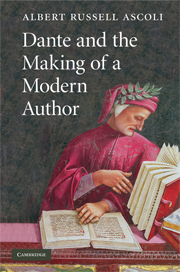Book contents
- Frontmatter
- Contents
- Preface
- Abbreviations of primary texts and translations
- INTRODUCTION
- Part 1 AN AUTHOR IN THE WORKS: DANTE BEFORE THE COMMEDIA
- Chapter 2 Definitions: The vowels of authority
- Chapter 3 Language: “Neminem ante nos”
- Chapter 4 Auto-commentary: Dividing Dante
- Part 2 AUTHORITY IN PERSON: DANTE BETWEEN MONARCHIA AND THE COMMEDIA
- Works consulted
- Index of proper names and works cited
Chapter 4 - Auto-commentary: Dividing Dante
Published online by Cambridge University Press: 22 September 2009
- Frontmatter
- Contents
- Preface
- Abbreviations of primary texts and translations
- INTRODUCTION
- Part 1 AN AUTHOR IN THE WORKS: DANTE BEFORE THE COMMEDIA
- Chapter 2 Definitions: The vowels of authority
- Chapter 3 Language: “Neminem ante nos”
- Chapter 4 Auto-commentary: Dividing Dante
- Part 2 AUTHORITY IN PERSON: DANTE BETWEEN MONARCHIA AND THE COMMEDIA
- Works consulted
- Index of proper names and works cited
Summary
“FO DUE PARTI DI ME”
The two preceding chapters provide a distinct perspective on Dante's pursuit of authority, considering, respectively, his relationship to the definitional tradition of the words auctor and auctoritas, and his struggle to renegotiate the hierarchy that attributes cultural authority to Latin and denies it to the vernacular. Both topics point toward a basic tension between the quest for an impersonal, traditional and/or transcendent auctoritas and the emergence of a personalized, modern and/or contingent authorship: a tension that tends to be linked to textual appearances of a Dantean “I,” io or nos, as may be. Both topics thus direct attention to the pervasive question of Dante's propensity for self-reference and auto-exegesis, and especially to his particular preference for forms in which he plays dual, even multiple, rhetorical roles, permitting an oscillation between impersonal object and personal subject of discourse. This chapter will consider how the forms of self-representation and self-interpretation adopted by Dante offer perhaps the most penetrating means of entry into such questions. In particular, a series of formal experiments, beginning with the pre-exilic Vita Nova and continuing through De Vulgari Eloquentia and, especially, Convivio, negotiate the immense distance between the relatively conventional, and thus impersonal, “I” of the early lyrics and the distinctively individual – internally differentiated – poeta-personaggio of the Commedia.
- Type
- Chapter
- Information
- Dante and the Making of a Modern Author , pp. 175 - 226Publisher: Cambridge University PressPrint publication year: 2008

